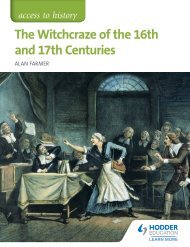SAMPLE
Sample-chapter-for%20Early-Elizabethan-England,-1558-1588,-Student-Book
Sample-chapter-for%20Early-Elizabethan-England,-1558-1588,-Student-Book
Create successful ePaper yourself
Turn your PDF publications into a flip-book with our unique Google optimized e-Paper software.
Preparing for your exams<br />
Average answer<br />
Exam tip<br />
Vagabonds were homeless people who wandered the country. As the<br />
population of England grew, so did the number of vagabonds. More people<br />
needed bread and this increased prices but some people couldn’t afford<br />
to buy enough to eat. More people needed somewhere to live. Rents also<br />
went up, causing homelessness. People left their villages to look for work<br />
and a better life in the towns. Towns like London had tightly packed<br />
shacks outside the city walls where homeless people lived and this caused<br />
crime, making things worse.<br />
The woollen cloth trade was very important to England. So much wool was<br />
needed that landowners decided to turn to sheep farming. Because they<br />
didn’t need so many labourers, unemployment increased. New farming<br />
methods and enclosure are other reasons why there weren’t lots of jobs<br />
in the countryside and why people became vagabonds. Anyone guilty of<br />
being a vagabond faced harsh punishments like whipping and some could<br />
even be executed. This shows vagabondage was serious.<br />
Some people were poor because they could not work. They were too old,<br />
too sick or disabled. Lots of children were poor, especially if they did not<br />
have a father. Women were paid less than men, making them very poor<br />
if they didn’t have a husband. When there was unemployment, people<br />
didn’t get paid at all. Unemployment happened when trade was bad and<br />
it made vagabondage worse.<br />
The main reason there was so much vagabondage in Elizabethan England<br />
was because the population grew so fast.<br />
Verdict<br />
This is an average answer because:<br />
Paper 2, Question 5c<br />
Population growth was the main reason why vagabondage<br />
increased in Elizabethan England.<br />
How far do you agree? Explain your answer.<br />
You may use the following in your answer:<br />
••<br />
sheep farming<br />
••<br />
rising prices<br />
You must also use information of your own. (16 marks)<br />
Consider points ‘For’ and ‘Against’ the<br />
statement and make a judgement. Be<br />
clear about your reasons for agreeing or<br />
disagreeing.<br />
This introduces the different<br />
threads of this argument clearly,<br />
and is supported by specific<br />
information.<br />
There needs to focus on explaining<br />
the impact of sheep farming in<br />
more detail: for example, using<br />
specialist terms like ‘enclosure’<br />
would help to strengthen the<br />
reasoning.<br />
A judgement is given but how it<br />
links to population growth or other<br />
factors is not clear.<br />
Draft material<br />
••<br />
it shows some knowledge and understanding of the issue and it adds an additional point to the stimulus (so<br />
it is not a weak answer)<br />
••<br />
it does not analyse factors enough or provide enough specific examples to support points<br />
••<br />
it does not explain criteria for judgment clearly enough to be a strong answer.<br />
Use the feedback to rewrite this answer, making as many improvements as you can.<br />
Strong answer<br />
Vagabonds were poverty-stricken, homeless people who did not have anywhere<br />
permanent to live. They wandered the country hoping to find work, begging or<br />
stealing. Their numbers increased as the population of England was growing fast,<br />
which led to rising prices. However, there were other changes, like new ways of<br />
farming and enclosure, which added to the number of vagabonds.<br />
Population growth was the underlying cause of rising vagabondage. It led to<br />
increases in demand for food, land and jobs, which caused rising prices and<br />
rents and falling wages. Wages fell because there were more people needing work<br />
and so labour became cheaper. Some employers cut wages because, even if they<br />
did, there were lots of people who would still take the jobs. When trade was bad,<br />
unemployment made conditions worse, especially in towns. The population grew<br />
much faster than food production. This led to higher prices for grain especially,<br />
and as much as 80% of poor people’s income was spent on bread. The demand for<br />
land grew with the population, too, and so rents rose. This forced people off the<br />
land, increasing poverty and vagabondage further. As a result, more people fell<br />
into poverty and became homeless.<br />
Sheep farming caused rural unemployment too. Woollen cloth accounted for over<br />
80% of England’s exports, making sheep farming highly profitable. Landowners<br />
therefore turned arable land into pasture. Sir Thomas Smith wrote a pamphlet<br />
in the 1560s blaming landowners for causing vagabondage. Flocks of sheep did<br />
not need as much labour as crops did, creating more rural unemployment. With<br />
no other work, many were forced to become vagabonds in the hope of finding<br />
jobs elsewhere.<br />
The Elizabethans saw unemployment as an important cause of poverty for the first<br />
time. … [Answer exemplifies the link between relations with Spain and the English<br />
cloth trade and points out the legislation that aimed to help the unemployed.]<br />
All three factors are important causes for increases in poverty and vagabondage.<br />
However, the root and most important cause was the rise in population. It caused<br />
lower wages and rising food prices and rents. As a result, there was a rise in<br />
vagabondage as people left the countryside, which made problems faced in towns<br />
even worse.<br />
Verdict<br />
This is a strong answer because:<br />
Preparing for your exams<br />
Paper 2, Question 5c<br />
Population growth was the main reason why vagabondage increased in Elizabethan England.<br />
How far do you agree? Explain your answer. (16 marks)<br />
The introduction explains<br />
what vagabonds were. It<br />
also outlines key reasons<br />
for this. As it is linked<br />
to other factors, its<br />
importance is clear.<br />
References to vagabonds,<br />
new methods of farming<br />
and enclosure shows a<br />
good understanding of<br />
the period.<br />
Clear focus on the stated<br />
factor. It also links it to<br />
inflation, showing how the<br />
two factors interacted to<br />
increase vagabondage.<br />
Well written and shows<br />
good knowledge and<br />
understanding of the<br />
period by referring to<br />
how unemployment and<br />
poverty had different<br />
causes in the countryside.<br />
Avoiding generalisations<br />
could strengthen it as not<br />
all landowners turned land<br />
into pasture.<br />
Draft material<br />
A strong conclusion with a<br />
judgement using criteria<br />
to show the increase in<br />
vagabondage (root cause,<br />
key to inflation, enclosure,<br />
rural depopulation).<br />
••<br />
information is wide-ranging and precise<br />
••<br />
factors are analysed and their importance is evaluated<br />
••<br />
the line of reasoning is coherent and the judgement is appropriately justified with clear criteria.<br />
44 45




